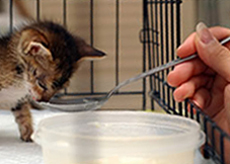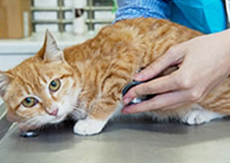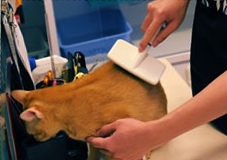Before getting a pet
Before getting a pet
Things to consider

"Am I suitable to be a pet owner?"
Before getting a pet, ask yourself the following questions. Press "Yes" or "No" as appropriate.
1. Are you allowed to keep a pet in the place you live in?

2. Is your home spacious enough for keeping a pet?

3. Do all your family members agree to have a pet?

4. Are you prepared to take care of a pet for its entire life?

5. Do you have time to take care of a pet?

6. Can you afford to keep a pet?

Types of pets
“What kind of pet should I get?”
Choosing the right pet
It is important to choose a pet that is most suitable for you. You will gain the most from a pet whose needs, temperament and personality are compatible with your lifestyle, physical capabilities and budget. When selecting a pet, ask yourself the following questions.
-
Do you prefer to stay indoors or enjoy going out?
If you spend most of your time at home, then you should consider getting a cat, chinchilla, hamster, rabbit or reptile. These pets are happy to stay indoors. If you enjoy daily activities outside of your home and are more active, then a dog might be suitable for you. Dogs enjoy outdoor exercises such as walking and running.

-
Are there young children or elderly people in your home?
If there are kids or elderly people in your home, you should consider the size and energy level of the pet. Chinchillas, hamsters and rabbits are very delicate, kids might not know how to handle these animals with care and might accidentally injure them. Large-sized dogs might accidentally knock down elderly people.

-
Are there other pets in your home already?
If you already have a pet in your home, consider carefully whether your existing pet will be able to adjust to the introduction of another animal into your home. Some pets may enjoy the company of another animal; others may feel jealous and resentful for having to share the owner’s love and attention.

-
Do you have very high standards about the cleanliness and tidiness of your home?
If you require your home to be very neat, then you may consider choosing pets that are confined to a cage or a designated area, such as chinchillas, hamsters, rabbits or reptiles. Dogs and long-haired cats might not be suitable for you. Also bear in mind that most pets with fur shed loose hairs.

-
How much money are you willing to spend on your pet?
Depending on the type of pet you get, the cost of keeping different pets can vary. It is advisable to consult a pet store or seek advice from existing pet owners about the estimated cost of keeping a certain type of pet.

-
How much time and attention can you give to your pet?
Different pets have different needs. Some pets such as dogs enjoy company and love interaction with humans. Dogs might bark frequently if left alone for many hours; whereas cats are content to be left alone. If you have long working hours and are always out, a cat might be a better choice for you.

-
Are you willing and able to provide the necessary care to meet your pet’s specific needs?
Some pets such as rabbits need their cages cleaned more than once per day and long-haired pets require regular grooming such as brushing and trimming. Dogs require walking and company. Learn as much as you can about the pet’s needs before getting one. Some pets also require regular health checks and vaccinations, you should be prepared to bring them to a vet for regular checkups. When your pet is sick, you should also bring it to a vet for treatment and provide adequate care.

-
Do you prefer an affectionate pet or one that is happy to be on its own?
Like human beings, different pets also have their own unique temperaments and personalities. If you want to be greeted passionately each time you come home, a dog might be suitable for you. If you prefer your pet to be more independent and quiet, a cat might be a better choice for you.

-
Do you prefer a pet that can be trained to obey your commands?
Some pets, such as cats, resist training. Most dogs, on the other hand, enjoy training as it gives them something to do and they have an inborn desire to please their masters..

-
How will your neighbours feel about your new pet?
If you are getting a dog, make sure it won’t bark frequently as this might disturb your neighbours. Remember to be considerate at all times by abiding by the law, cleaning up after your pets and controlling your pets properly in public places so that they won’t cause nuisances to others.

